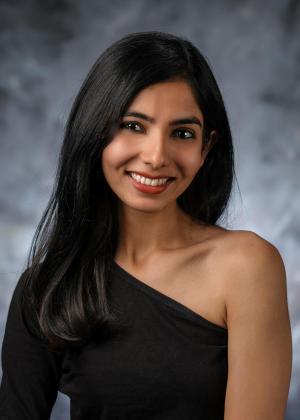
Komal is a Ph.D. Candidate in the Department of Chemistry where she specializes in Organic Chemistry. She has mentored graduate and undergraduate students in supporting their academic success and professional growth. As Co-President of ChemPD, she leads a graduate student organization that enhances career exploration and overall preparation through an annual Chemistry Career Symposium. Komal has been selected for numerous other awards including the BD Biosciences Research Accelerator Award.
Komal NA
Ph.D. Candidate
UC Santa Barbara Department of Chemistry
Recipient of the BD Biosciences Research Accelerator Award
Fun Fact: Komal speaks four languages, and enjoys collecting flight and train tickets as keepsakes from her travels. She also hosts a podcast that focuses on questioning societal norms and stereotypes particularly those affecting women in India and aims to create a space for honest and reflective conversations around these issues.
"Receiving this award has been a source of both encouragement and motivation. Knowing that I was chosen from a competitive pool of applicants makes me feel incredibly grateful and inspired to continue pushing the boundaries of my research. This award has not only provided me valuable financial support but has also affirmed the importance of the work I am doing – in the lab, in mentoring, and through community outreach. Please know that your generosity has made a meaningful difference in my academic journey. With this support, I am better equipped to pursue my research goals with focus and confidence, and I remain committed to using this opportunity to its fullest.Thank you again for your belief in students like me. Your investment in graduate research and education is truly impactful, and I'm honored to be among the recipients of this award."

What do you like to do in your spare time?
"Outside of my Ph.D., I enjoy theater practice and dance, both of which I find to be creative outlets and grounding activities alongside research."
Post Ph.D. plans?
"After completing my Ph.D., I plan to remain in research and development, with a strong emphasis on translating research and scientific knowledge to broader communities. In particular, I hope to create pathways for underprivileged school students and women from underrepresented and marginalized communities who often lack access to educational resources. Coming from a background where women were not always encouraged or supported in pursuing education, this mission is deeply personal to me and central to how I envision my career."